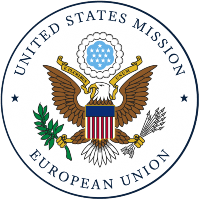
Summary
Globally, the transport sector accounts for 37% of CO2 emissions from end-use sectors, and in 2019 it was responsible for more than half (57%) of the world’s oil consumption. In the second session of Friends of Europe’s Transatlantic Climate Dialogue series, four young entrepreneurs from both sides of the Atlantic discussed the potential of their climate tech solutions to decarbonise transport.
“Reimagining transport and making it carbon-neutral would be phenomenal for addressing climate change globally”, said event moderator and Friends of Europe COO and Chief Spokesperson Dharmendra Kanani. In the context of the ongoing energy security and climate crises, scaling up clean transport solutions is more urgent than ever, he added.
William Bergh, founder and CEO of Cling Systems (Sweden), explained how his start-up enables key players in the Lithium-ion battery value chain to close the circular economy loop, ensuring that end of life batteries can either be used as stationary storage or ‘mined’ for their raw materials. “We’re building a battery database, so we know which batteries have which chemicals in them,” he said. “Our mission is to build the world’s first ‘online mine’.”
Vianova is a platform that allows cities, public transport operators and other mobility providers to visualise ways to make transport safer and greener, explained Thibaud Febvre, Co-Founder and COO of Vianova (France). “It enables the exchange of information between mobility providers and cities on traffic and kerbside management,” which results in more cycling lanes, more dedicated mobility hubs and fewer cars on the road. The platform is used by 60 cities, including Zurich, Stockholm and Brussels. “It has created a significant understanding of how to transition more citizens to more sustainable, efficient and human-scale modes of transport,” he said.
Eva Romagosa, Co-Founder and Chief Strategy Officer at BusUp (Spain), explained her start-up’s mission to help companies and employees deal with the high economic and environmental cost of commuting, highlighted by the pandemic and the war in Ukraine. “Outside city centres there is often no public transport, with cars as the only alternative. Through digitalisation and optimisation, we allow companies in the same areas to share transport services, we offer more routes and options for employees, which results in lower costs per passenger and fewer environmental impacts,” she explained. The cost per passenger is about one third of the cost of using a car.
Aviation is responsible for about 3% of global emissions and is one of the most difficult sectors to decarbonise, with currently no scaled-up solutions, said Kevin Noertker, Co-Founder and CEO at Ampaire (USA). His company is bringing the trend towards electrification into aviation, by upgrading existing airplane types with hybrid-electric propulsion systems. “Using electricity in aviation leads to a significant reduction in fuel burn and emissions, including leaded fuel which is still used in smaller aircraft in the US. Even with hybrid aircraft, you reduce fuel burn by about half, as well as noise.” Electrification will also increase accessibility, he argued, because smaller aircraft become cheaper, enabling airlines to fly them at higher frequencies to more destinations, serving more people.
Asked about the biggest barriers to scaling up these technologies, Romagosa said that while employee benefits with tax deductions for sustainable commuting were common in countries such as the US and Brazil, the situation is not as good in Europe, especially in areas with no access to public transportation. Febvre said that technically, it can be difficult to integrate large datasets, while from a regulatory standpoint data sharing remains a challenge. There has been a need to educate the European market about the digitalisation of traffic management and enforcement, as well as mobility sharing. “Policymakers should look at simplifying the regulatory framework rather than complexifying it,” he added.
Bergh pointed out that the EU regulations on end-of-life for vehicles and on batteries launched in 2000 and 2006 respectively lacked rules on EVs and Lithium-ion batteries. Both regulations are currently being updated but now, “no-one can really bet on where the industry is going to head”. For him, the key to an affordable, scalable model is a strong second-hand market. But for EVs, up to 70% of the car’s value is the battery, so “determining the battery’s value makes it easier for first-time buyers to invest in electric mobility,” he stated.
Meanwhile, Noertker said that most sustainable transport legislation does not include aviation, because it was only recently that it was thought possible to decarbonise aviation. A transition needs to happen, as for instance charging station infrastructure does not exist for aircraft. Another challenge is that aviation is a highly regulated industry because safety is critical, so requirements for suppliers and technology are much stricter than for ground transport. Nonetheless, Ampaire have been very successful, having flown over 20,000 km hybrid-electric already. Regarding the advantages of the technology, Noertker stated that because fuel burn comprises 30-40% of an airline’s budget, electrification means significantly lower cost per passenger mile, which can reduce ticket prices, allowing airlines to serve more communities in a more convenient way. The harmonisation of legislation across borders would also be essential to scale up such technologies, he stated.
When it comes to the future of mobility, there is a lot of pressure on the auto industry to deliver clean vehicles thanks to the European Green Deal, but this will not happen overnight, said Febvre. To avoid replacing internal combustion engine congestion with EV congestion, “we need to adopt new models of car ownership,” he added. That could mean smaller vehicles in cities, including micro-mobility solutions such as e-scooters, as well as car-sharing and autonomous vehicles, Bergh pointed out. “The revolution we are seeing is the consequence of seeking more efficient forms of transport,” concluded Romagosa.
This series is part of the European Young Leaders programme led by Friends of Europe that connects young leaders throughout Europe and beyond. They are trailblazers, exceptional business and civil society leaders, politicians, entrepreneurs, academics, artists, scientists, journalists and athletes.
The EYL40 programme builds bonds across nationalities, areas of work as well as different political and ideological viewpoints, develops innovative solutions for the challenges facing our societies and promotes role models who are passionate and committed to Europe and who can inspire our citizens.
About
The event is accessible to all on the event’s page and on our YouTube channel.
Follow us on Twitter @friendsofeurope and join the discussion #TransatlanticClimateDialogue
Globally, the transport sector has the highest reliance on fossil fuels and accounts for 37% of CO2 emissions from end‐use sectors, according to the International Energy Agency. While significantly affected by the Covid-19 pandemic, emissions resume rising as demands increases and the uptake of alternative fuels remains limited. In the context of the ongoing energy security and climate crises, scaling up clean transport solutions is more urgent than ever.
Connecting inspiring voices on both sides of the Atlantic through our Critical Thinking Live format, the Transatlantic Climate Dialogue series underlines the power of young entrepreneurs and innovators in the fight against climate change and aims to inspire citizens to take action.
The second debate in this series will be dedicated to climate tech for clean transport.
Decarbonising the transport sector is key to tackling climate change. The good news is – transport is the most heavily invested area in climate tech. In this session, we aim to shed light on various climate tech solutions of the present and of the future that enable the decarbonisation of the transport sector and exchange views on how to ensure that these technologies are scalable but also affordable, how does the future of transportation look like, and how to ensure that these new technologies do not have negative spill over effects.
This series is part of the European Young Leaders programme led by Friends of Europe that connects young leaders throughout Europe and beyond. They are trail blazers, exceptional business and civil society leaders, politicians, entrepreneurs, academics, artists, scientists, journalists and athletes.
The EYL40 programme builds bonds across nationalities, areas of work as well as different political and ideological viewpoints, develops innovative solutions for the challenges facing our societies and promotes role models who are passionate and committed to Europe and who can inspire our citizens.
Related content
- Missed the first Critical Thinking Live that highlighted how individuals can use technology to make climate-friendly choices? You may watch it here: Transatlantic Climate Dialogue: Tech solutions for individual climate action
European Young leaders (EYL40) also supported climate action through a dedicated campaign on what citizens may adapt in their behaviour https://www.friendsofeurope.org/initiatives/the-european-climate-pact/
PHOTO CREDIT: Soulful Pizza/Pexels
Schedule
Speakers

Founder and CEO of Cling Systems (Sweden)
William Bergh is the Founder and CEO of Cling Systems, a B2B market platform for used electric vehicle batteries. Developing a global solution to enable circular value chains of lithium-ion batteries, Cling is challenging the material extraction industry by consolidating and giving access to critical raw materials. Prior to starting Cling, Bergh developed recycling strategies and designed battery systems for recycling at Northvolt. He attended Lund University where he founded the first electric formula racing team.

Co-Founder and Chief Strategy Officer at BusUp (Spain)
Eva Romagosa is the Co-Founder and Chief Strategy Officer (CSO) at BusUp, a mobility service provider that allows companies of all sizes to improve their employees’ daily commute by providing them with efficient, flexible and sustainable transportation services at an affordable price. BusUp aims to disrupt car commuting in greater metropolitan areas, through technology and innovation, and thus contribute to more sustainable mobility. BusUp has become a leading corporate mobility solution in Europe, United States and Latin America. In her role as CSO, Romagosa is responsible for understanding market trends and customer needs, managing the company’s branding and communication strategies, and overseeing its innovation and strategic projects.

Co-Founder and COO of Vianova (France)
Thibaud Febvre is Vianova’s co-founder and COO, with a focus on People, Finance, Marketing and Operations. Vianova is a data platform that uses connected vehicles data to help cities and mobility operators build more efficient and sustainable transport systems. He has a Master’s degree in Data Sciences & Business Analytics from CentraleSupelec and ESSEC. Prior to Vianova he co-founded Spark Horizon, another mobility startup. He previously worked as a Product Marketing Manager at Google and as a Data Sciences Consultant at IBM.

Co-Founder and CEO at Ampaire (United States of America)
Kevin Noertker is Co-founder and CEO of Ampaire. Over the past half decade, Kevin and his team at Ampaire have pioneered practical, compelling electrified flight through the upgrade of existing aircraft types. In the last years, Ampaire flew the world’s largest hybrid electric aircraft and deployed and demonstrated electrified flight with multiple airlines across the globe. To date they have flown over 20,000km hybrid electric. Prior to Ampaire, Noertker contributed engineering and program management expertise to aircraft and satellite development programs at Northrop Grumman, and as a research fellow at Caltech and NASA’s Jet Propulsion Laboratory. An entrepreneur at heart, Noertker is driven to apply the science and engineering disciplines of large aerospace organizations to pressing environmental problems here on Earth.
Activities
European Oceans Pact: is maritime transport on board?
Next event In person & livestreamed

- Area of Expertise
- Climate, Energy & Natural Resources
Staying the course: driving sustainability forward in a shifting…
Past event In person & livestreamed

- Area of Expertise
- Climate, Energy & Natural Resources
Navigating risks and enhancing resilience: charting Europe’s energy and…
Past event In person & Livestreamed

- Area of Expertise
- Climate, Energy & Natural Resources
Navigating the EU’s sustainability transitions in a polycrisis world
Past event In person & livestreamed

- Area of Expertise
- Climate, Energy & Natural Resources
A betrayal of the future: the EU must act now
- Category
- #CriticalThinking
- Author
- By Benjamin Van Bunderen Robberechts
Citizen-led recommendations for the Horizon Europe Missions on…
- Category
- News
- Area of Expertise
- Democracy
Policy Voices | What is the cost of not doing Carbon Dioxide Removal?
- Category
- Podcast
- Area of Expertise
- Climate, Energy & Natural Resources
Competitiveness and clean energy, the challenge of European industries
- Category
- #CriticalThinking
- Author
- By Michele Bologna

- Area of Expertise
- Climate, Energy & Natural Resources

- Area of Expertise
- Climate, Energy & Natural Resources

- Area of Expertise
- Climate, Energy & Natural Resources

- Area of Expertise
- Climate, Energy & Natural Resources
Continue
the debate on
-
twitter
#TransatlanticClimateDialogue #EYL40 #CriticalThinkingLive @FriendsOfEurope
- Debating Europe



